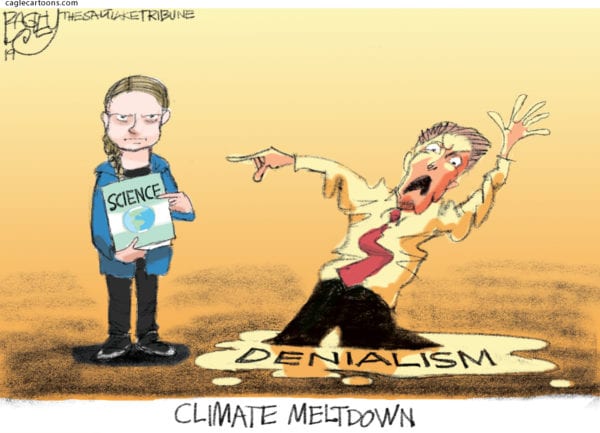BY ELEANOR BYRNE, BENJAMIN BOWMAN
AND CHLOE GERMAINE BUCKLEY
 There’s no doubt that young people today are driving action on climate change. The #FridaysforFuture school strikes are arguably the most dedicated and sustained direct action in a generation. School pupils have kicked off an international movement committed to addressing the injustices, mass extinctions and environmental damage caused by climate change – while also building global networks, speaking out in public and holding the adults around them to account.
There’s no doubt that young people today are driving action on climate change. The #FridaysforFuture school strikes are arguably the most dedicated and sustained direct action in a generation. School pupils have kicked off an international movement committed to addressing the injustices, mass extinctions and environmental damage caused by climate change – while also building global networks, speaking out in public and holding the adults around them to account.
As more adults and institutions join the protests, it seems the agency of these young people is finally being recognized. But conversations about climate change still appeal to authorities for answers – whether calling for politicians to act, or for people to listen to scientists.
Of course, listening to experts and holding politicians to account is an important part of what climate activists need to achieve. But it’s not the only part. As the schools strikes continue to gain momentum, it’s time to think about how young people can be meaningfully involved in shaping the future of our planet.
Unfortunately, there are still significant barriers preventing children from making their voices heard in democratic societies – not least the way they are represented in the media. As academics interested in children in politics and culture, we’re exploring these issues as part of a project called Europe and the Child – Crisis, Activism, Culture. So far, we’ve found that cultural images of children involved in activism reveal adult desires and anxieties, rather than providing real empowerment.
ARE YOU LISTENING?
Swedish activist Greta Thunberg captured the world’s attention when she was invited to address world leaders at the UN conference on climate change in December 2018, at just 15 years of age. Since then, her school strikes have become a global phenomenon. Through international media coverage and meetings with high-profile political figures, Thunberg has brought the climate emergency into view, right at the heart of political power in the West.
Thunberg has explained that her actions were inspired by by the Parkland students’ protests against gun violence, while the school strike model builds on the walkouts and sit-ins by African-American students during the civil rights era.
Thunberg is not the first young person to address the UN climate conference. Kathy Jenil-Kijiner, a Marshall Islands poet and activist, has called for urgent action as rising sea levels threaten her home, as has young diplomat Yeb Sano from the Philippines. Global climate injustice cannot be fully understood without listening to, and empowering, young people from around the world.
Thunberg’s role as spokesperson for the younger generation is fraught with difficulties. As a child herself, Thunberg has insisted that the blame for the current climate emergency – and the responsibility for fixing it –lies with older generations. Yet adults and establishment figures have repeatedly sought to position her either as a prophet and a child saviour, or as a naive puppet of interested parties.
For example, writer and activist Naomi Klein praised Thunberg for her moral clarity, arguing that she is one of the youth voices that has “burst through the bureaucratic language with which we shield ourselves from the reality of the stakes, the extraordinary stakes of our moment in history”, and that young people have found a sense of agency in Thunberg’s school strikes, and her insistence that no one is too small to make a difference.
Conversely, Thunberg has also been subjected to a series of attacks from right-wing establishment figures and climate deniers, doubting her sincerity and ridiculing her appearance and her way of speaking, with reference to her Asperger’s diagnosis. Some of those criticisms have also been levelled at the school strikes movement, with politicians calling young participants “truants” and “puppets.”
A STORY OF EMPOWERMENT
Beyond the media coverage, there has also been a surge in fiction and non-fiction books published about the climate crisis for young people. Some publishers have called this “the Greta effect”, though the environment has been a concern in children’s literature since at least the 1970s, exemplified by Dinosaurs and all that Rubbish by Michael Foreman.
In contrast to that classic parable – which seeks to educate its readers – recent books including Lily Dyu’s Earth Heroes and Martin Dorey’s Kids Fight Plastic present children as saviours of the planet.
It’s positive that books by adults are recognizing the agency of young people and seeking to empower them further. But this rhetoric also burdens young people with the responsibility for change, while political institutions afford them little power.
It’s not enough to put children on the covers of newspapers and call them “heroes.” It’s not even enough to listen to the concerns they’re raising through the global strikes for climate action. Adults in positions of authority need to give young people the means to change the world and create their own visions for the future.
Eleanor Byrne is a senior lecturer in English, Manchester Metropolitan University; Benjamin Bowman is a lecturer, Manchester Metropolitan University; and Chloe Germaine Buckley is a senior lecturer in English, Manchester Metropolitan University.
Editor’s Note: This story was produced by The Conversation [UK]. It is republished here as part of The Oklahoma Observer’s partnership with Covering Climate Now, a global collaboration of more than 300 news outlets to strengthen coverage of the climate story.







